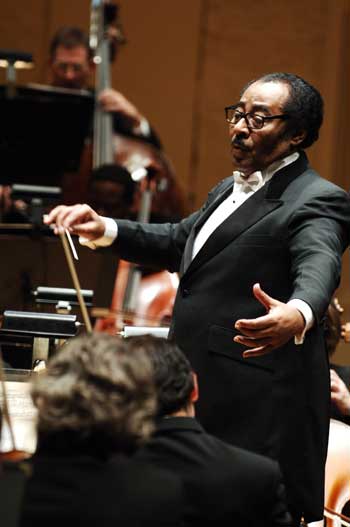Freeman’s final MLK program with Sinfonietta takes a nostalgic look back

Martin Luther King’s dream is one that Paul Freeman knows well.
The founder and outgoing music director of the Chicago Sinfonietta met the martyred civil rights leader twice. His last encounter with King was a serendipitous early morning airport meeting just weeks before his assassination—a sign that spurred Freeman to his mission of creating a diversity-conscious orchestra.
One of Freeman’s first actions when he founded the Sinfonietta 24 years ago was to celebrate the then-new Martin Luther King holiday with a tribute concert that has become one of the city’s most-anticipated annual MLK Day events.
With Freeman’s imminent retirement at the end of the season, this year’s MLK birthday concerts are his last as music director. Sunday afternoon at Dominican University in River Forest Freeman led a program that revisited music of African-American composers associated with him since Freeman recorded their works in the pioneering 1970s Black Composers Series on Columbia.
Ulysses Kay’s Theater Set for Orchestra reveals Kay’s fascinations with Bartók-like string writing as well as the angularity of Stravinsky’s Neo-Classical rhythms all wrapped up in Kay’s own imaginative style. The short piece has a celebratory air about it and the Sinfonietta played it with refined, boisterous gusto.
George Walker’s Lyric for Strings is a more serious and nuanced affair, bringing to mind other slow orchestral string pieces, notably Mahler’s Adagietto from the Fifth Symphony and Barber’s Adagio for Strings. Like Barber’s work, Walker’s Lyric also began life as the movement of a string quartet before being orchestrated as a stand-alone piece.
Long associated with the Sinfonietta particularly in his stint as music director of the Joffrey Ballet where the Sinfonietta served as its resident ensemble, Leslie B. Dunner conducted the rest of the program, which included the hybrid work Concerto for a Genius.
Trumpeter and composer Orbert Davis arranged this concerto for soloist Reginald Robinson out of piano works by Robinson, a Chicago ragtime pianist and MacArthur Foundation Genius Award recipient (hence the title).
Concerto for a Genius was premiered by Davis’ Chicago Jazz Philharmonic in 2007 but has been reworked for these concerts by Davis. The four-movement suite has little unity between movements but showcases Robinson’s style in four guises.
The first movement, Mr. Murphy’s Blues, is the most interactive and cohesive portion of the piece, a bluesy-ragtime inspired true concerto-like romp in the Gershwin tradition. Janet owes so much to Joplin’s The Entertainer both in style and thematic substance that at times it was almost a paraphrase. Ansaar features tango and rumba rhythms in an almost zarzuela-like orchestral texture while The 19th Galaxy recalls Gottschalk.
There have been various suites and versions of excerpts from Porgy and Bess, including the 40-minute “concert version” that Gershwin friend and arranger Robert Russell Bennett put together in 1956.
Scored for soprano, baritone, chorus and orchestra — augmented here by tenor — it features most of the work’s best-known numbers presented chronologically. Dramatic continuity and musical context are both sacrificed, however, due to singers doubling songs of different characters and huge narrative gaps between numbers.
When originally done, such arrangements were rare opportunities for audiences to hear this music live, but these days the complete opera is known well enough that one wonders if it wouldn’t have made more sense to simply do a concert version of the entire work rather than merely pluck the raisins out of the cake.
Not helping matters was the presence of a fifty-member amateur chorus so indistinct and unfocused that it was overwhelmed by the soloists and orchestra. Also vocal soloists often favored volume over diction and consonants were a struggle to hear.
The best moments were provided by soprano Lisa Daltirus who led a moving My Man’s Gone Now and tenor Chauncey Packer who nearly stole the show with an energetic It Ain’t Necessarily So.
The program will be repeated 7:30 p.m. Monday at Symphony Center; 312-236-3681; chicagosinfonietta.org.
Posted in Performances





Posted Jan 19, 2011 at 2:10 am by Barbara Wright-Pryor
Perhaps a better hearing of the concert would have been Monday night at Symphony Center.